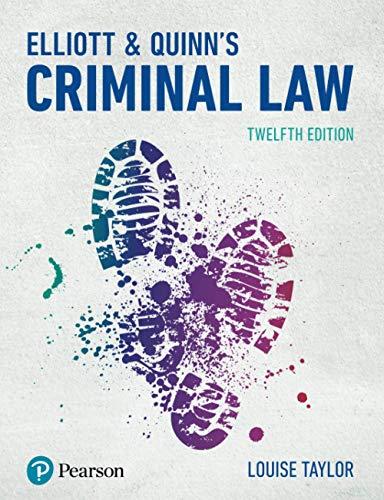Question
The state provides various benefits to people. Whether we are discussing the availability of public goods like education or public safety or if we are
The state provides various benefits to people. Whether we are discussing the availability of public goods like education or public safety or if we are talking about the efforts made by the state to provide or subsidize resources like transportation (i.e. AmTrack) or health care (Medicad and Medicare) the state is by all accounts involved in providing for the people under its governance. Does such provision entitle the state to unconditional adherence and support of policies and laws that are arguably unjust?
For example, the Corrections Corporation of America (CCA) is one of the largest for-profit prison companies in the country. The company's revenue generating model functions squarely on the premise that endorses higher incarceration rates to turn a profit. The annual report issued by CCA in 2014 stated, "any changes with respect to drugs and controlled substances or illegal immigration could affect the number of persons arrested, convicted, and sentenced, thereby potentially reducing demand for correctional facilities to house them." In an effort to maintain the profit model, CCA and other for-profit prisons will provide monetary support to any candidate (democratic or republican) that has the best chance of winning re-election. Once re-elected these companies expect favorable legislation to be passed in support of their prisons as a reward for their campaign contributions. This has resulted in the development of laws and policy that criminalize behaviors and actions that are more likely to result in the arrest, conviction and imprisonment of individuals.
In Florida for instance, several cities have enacted laws that prevent the sharing of food with community members who are homeless. These laws impose fines and prison punishments on the provider and the recipient of shared food. These laws have increased the arrests and convictions for homeless persons and for "Good Samaritans" like Arnold Abbot in Fort Lauderdale. Arnold, and those like him find these laws to be unjust, as they criminalize behavior and actions that have positive impacts for the community and are undergird by good intentions. Should people like Arnold adhere to the law, or do they have a right to ignore and/or rebel against it? Or, does the mere fact that we live under the provision of state mean that we have implicitly agreed to abide by the laws whether we find them just or unjust?
Step by Step Solution
There are 3 Steps involved in it
Step: 1

Get Instant Access to Expert-Tailored Solutions
See step-by-step solutions with expert insights and AI powered tools for academic success
Step: 2

Step: 3

Ace Your Homework with AI
Get the answers you need in no time with our AI-driven, step-by-step assistance
Get Started


